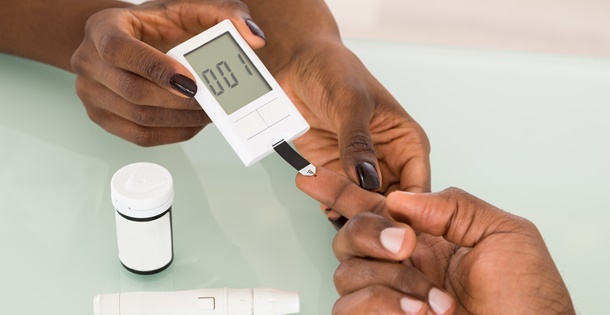Dealing with the day-to-day aspects of diabetes—blood glucose, nutrition, and lifestyle management—is a formidable challenge for all people with the disease.
However, American men living with diabetes also grapple with unique physical, emotional, and sexual health issues, according to recent survey findings from the American Diabetes Association. In an online survey of 1,000 men with Type II diabetes and their spouses, researchers found that many men with diabetes are aware that they are at an increased risk for complications such as heart attack, stroke, and blindness, but not aware of the increased risk for other conditions affecting emotional and sexual health. In fact, the survey showed that more than one-third admitted to experiencing associated with low testosterone levels – depression, erectile dysfunction, and fatigue. The survey also revealed that men are reluctant, for many reasons, to discuss disease-related complications with a doctor, further diminishingtheir ability to take a proactive approach to managing their disease.
“These survey results reinforce that there are some health issues associated with diabetes that men are currently aware of, life the importance of managing blood glucose, blood pressure, and cholesterol,” says Richard M. Bergenstal, M.D., American Diabetes Associated Vice President, Medicine & Science. “But these same men were not aware that diabetes can also negatively affect several emotional and sexual health issues such as erectile dysfunctin and low testosterone.”
Responding to this need, the ADA recently launched an awareness campaign (www.diabetes.org/menshealth ) to help men and their families better manage the disease. To learn more about the survey and new campaign, the Post spoke with Dr. Bergenstal.
Why launch a campaign specific to men’s health?
Twenty-four million people are living with diabetes – half of them are men. Numberous awareness programs have focused on women’s health – largely because they make most of the health decisions in families. Additionally, men typically don’t dwell on personal health issues unless some crisis emerges.
Successfully managing diabetes requires prevention and planning ahead. In our survey of 1,000 men and their spouses, we discovered that men didn’t understand many aspects of the disease, including how diabetes can affect sexual health, emotional states, and relationships. Survey results also revealed that many men feel uncomfortable bringing up these sensitive issues with their doctors. The new campaign addresses sexual health and function as well as emotional health, including the issue of depression.
Certainly, sexual intimacy is an important part of life and relationships. Were men in the survey aware that diabetes could significantly affect their sex lives?
No. But, in fact, impotency or erectile dysfunction (ED) is two to four times as common in men with diabetes. While there are good treatments for ED, men don’t really want to discuss the issue with their doctors perhaps due to embarrassment. And doctors are busy monitoring for other complications associated with diabetes—problems with eyes, kidneys, nerves, and heart disease. As a result, health care providers may never get around to asking if men are experiencing other issues.
Many men tend to associate erectile dysfunction with getting older. How does diabetes affect a male’s sexual health?
First, ED is not a normal part of getting older, and it doesn’t happen to all men with diabetes. However, there are two factors that one must consider. One is as a complication of diabetes. An erection results when there is good blood flow to the penis, provided that the nerves are working properly. Diabetes affects blood flow and nerves. Over time, both can become damaged, leading to ED. As a result, if you don’t control your diabetes, you are at higher risk for ED because you may damage either one or both of those circuits.
The second factor —unrelated to controlling diabetes —is low testosterone levels. Studies show people with diabetes are twice as likely to have low testosterone levels as people without the disease. Low testosterone can decrease your interest in sexual activities or actually get low enough to decrease cians should be screening men with diabetes for more of these issues as part of a patient’s annual diabetes evaluation. We’ve got to start the discussion, and it is usually a family affair. We want men to step up, but we want their spouses to be supportive as well.
Were men in the survey surprised that anxiety, stress, and depression are associated with diabetes?
Yes. Many men in the survey considered coping with diabetes more of a nuisance. But the link between diabetes and depression is much more than a nuisance: It keeps some people from functioning. In fact, depression is twice as common in men with diabetes.
If depressed, you really aren’t on top of your diabetes—a finding that’s been proven now in good studies. For example, men who are depressed don’t monitor sugars regularly, don’t care if they miss a dose of medicine, and are not as likely to think about health. Treating the depression often improves diabetes management.
How do you discern if the depression is due to low testosterone or a complication of the diabetes?
Usually, our first goal for people with diabetes is to get their blood sugar within a reasonable range so they feel better. High blood sugars can really drain you. If you can get blood sugars within a reasonable range, people function better, make rational decisions, and feel engaged. Then, you start tackling other issues like depression. To build a cycle of health and well being, you’ve got to attack all of these areas, because any one of them could pull you down. In addition, there are very simple screening questionnaires for depression. If low testosterone is suspected, a simple blood sample can be drawn to check testosterone level.
Do diet and exercise help prevent erectile dysfunction that occurs as a side effect of diabetes?
Controlling diabetes definitely decreases the risk of sexual dysfunction because it decreases the chance of abnormal circulation or nerve damage.
But if men with diabetes remain overweight, they may continue to have low testosterone levels even if they have controlled their blood sugar levels.
It’s really the weight and insulin resistance that leads to low testosterone. If a man controlled his blood sugars with medication and lost 30 pounds, he probably would experience fewer issues with low testosterone including reducing his chances of experiencing ED.
ED is hard to reverse. If it’s in an early stage when diabetes may be out of control, interventions can help reverse or stop its progression. But if you have waited 10 years, it’s hard to reverse. If ED or low testosterone is present, ask about treatment. While prevention is the best measure, there are effective treatments for many men as well.
What is your take-home message?
Men can take small steps that can have a big impact on their ability to better manage their diabetes. Doing what they know, like staying active, sticking to a healthful diet, learning about increased risks for related conditions, and talking with a doctor if they are suffering from bothersome symptoms, is the key to managing diabetes today.
Become a Saturday Evening Post member and enjoy unlimited access. Subscribe now



